Power Pedaling with Bamboo Bike
A bamboo bicycle under development in Mexico promises to be tougher, lighter, and less prone to heat, and thus an innovative way to replace metal parts with natural materials. But wait, there’s more: The bamboo bike will also generate energy.
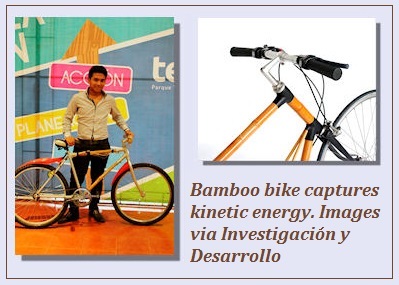
Pedaling a bike creates kinetic energy, so the goal of the Bambootec consortium is to capture that energy through circuits in the rims and run it to converters and regulators in the system’s core under the seat. The energy is converted to electricity—about 10 volts—which can recharge mobile devices and a smartphone battery, and power a navigation dashboard on the handlebars, connected via Bluetooth.
The team’s goals now are to accelerate the charging process and to develop the machinery to scale the bamboo bike up for mass production. Bambootec, located in Yucatán, is a participant in Cleantech Challenge Mexico, a contest that promotes the development of green enterprises.
Source: Investigación y Desarrollo [in Spanish].
Signals: appropriate technology, bicycles, green energy, Mexico, renewable resources, sustainability, transportation
Philanthropy and Productivity
Encouraging workers to give at the office may turn out to be a good way to boost their productivity. A study at Britain’s University of Southampton found that, when subjects could choose the amount of performance-based pay they would share with charity, their performance increased considerably.

“A lot of studies have shown how financial incentives, like bonuses and stock options, can improve performance,” said the study’s lead author, University of Southampton economist Mirco Tonin, in a press statement. “But our results provide empirical support for the growing recognition that some workers are also motivated by advancing social causes through their efforts.”
While financial incentives like bonuses are still more effective at motivating workers, the difference is not as wide as many believe, suggests the study, to be published in Management Science. Tonin concludes that “firms willing to introduce corporate giving programs may want to consider giving employees the opportunity to ‘opt in.’”
Reference: “Corporate Philanthropy and Productivity: Evidence from an Online Real Effort Experiment,” Mirco Tonin and Michael Vlassopoulos, Management Science, DOI:10.1287/mnsc.2014.1985
Signals: business, philanthropy, productivity
Why Some Fossil Fuels Need to Stay in the Ground
A large portion of the world’s untapped coal, oil, and natural gas needs to stay in the ground through 2050 in order to keep global warming from exceeding the internationally agreed limit of 2°C, warns a new study from University College London’s Institute for Sustainable Resources.
The study, published in the journal Nature, recommends that the Middle East leave 65% of its gas in the ground, and that 80% of the coal in China, Russia, and the United States remain undisturbed through the next 35 years, along with 260 billion barrels of petroleum reserves—the equivalent of all of Saudi Arabia’s oil reserves.

How do we avoid either an economic catastrophe or an environmental one? Energy companies (and their investors) should divert the search for more fossil fuels to more alternatives, according to the study’s co-author, environmental policy professor Paul Ekins.
“The greater global attention to climate policy … means that fossil fuel companies are becoming increasingly risky for investors in terms of the delivery of long-term returns,”says Ekins. “I would expect prudent investors in energy to shift increasingly towards low-carbon energy sources.”
Reference: C. McGlade and P. Ekins, “The geographical distribution of fossil fuels unused when limiting global warming to 2°C,” Nature (January 7, 2015). DOI:10.1038/nature14016
Signals: climate change, energy, fossil fuels, global warming, low-carbon fuels
Book Note: Toward a Freakier Mind-Set
Finding and interpreting signals or outliers in the landscape is part of the job for foresight professionals. It requires us to think differently about what we see, and even about what we seek, which may be why many of us self-identify as geeks or freaks.
In Think Like a Freak (Morrow, 2014), University of Chicago economist Steven D. Levitt and journalist Stephen J. Dubner share techniques for training your mind to think differently, a prerequisite for foresight.
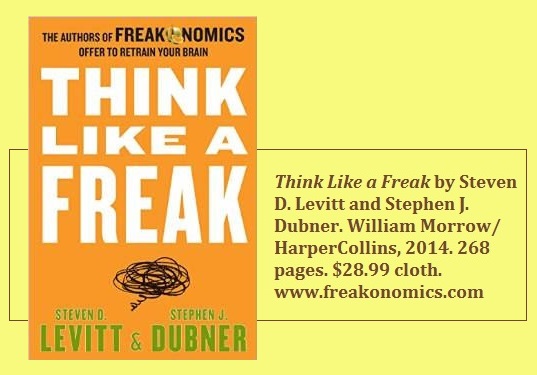
The process is both rewarding and humbling. Why “humbling”? Because you’ll need to learn to say “I don’t know” more often (faking it could have higher social consequences), to think about problems as a child would (ask naïve questions; break things into smaller bits), and to permit yourself to quit when your efforts are futile: Let it go.
Think Like a Freak is well-populated with case studies for freaky thinking in business, which should prove of value to futurists and foresight professionals working with business trends and clients.
Excerpted from Foresight SIGNALS Blog. Read the review. More information.
Signals: business, creative thinking, Freakonomics, futurist methodologies, strategies, trends
Futurists at Work, Foresight in the News
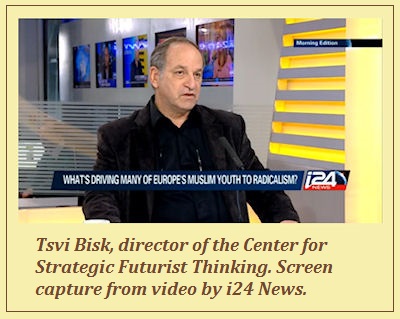
Islam, Islamism, and Islamaphobia: “We have to liberate ourselves from the phobia of being accused of Islamaphobia,” strategic futurist Tsvi Bisk told Israeli television i24 News, responding to a series of lone-wolf terror attacks in France in December. The war, he said, is not on terrorism, which he described as a strategy (like a flanking maneuver), nor on Islam, but rather on Islamism—“a totalitarian ideology whose aim is to conquer the world.” However, he continued, “that does not mean one iota that you tolerate discrimination against law-abiding Muslims. In other words, it’s a two-pronged attack. You respect and integrate law-abiding Muslims and you uncompromisingly fight against radical Islamism. I don’t see why that’s such a crazy thing to think about.” Watch the interview. Contact Tsvi Bisk, Center for Strategic Futurist Thinking.
Futurist in Government: Bulgarian futures researcher and strategic planner Mariana Todorova is now a Member of Parliament, joining the National Assembly of the Republic of Bulgaria in November 2014. She previously served as an adviser to the president (2008-2014) and now has joined the Parliament’s committees for Education and Science and for Labor, Social, and Demographic Policy. Formerly an assistant professor at the Bulgarian Academy of Sciences, she has worked toward developing a new methodology of scientific forecasting that combines counterfactual analysis and scenario building. Details
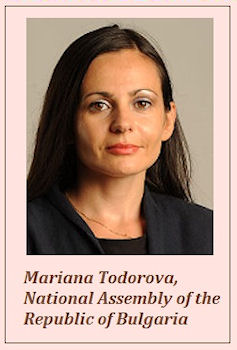
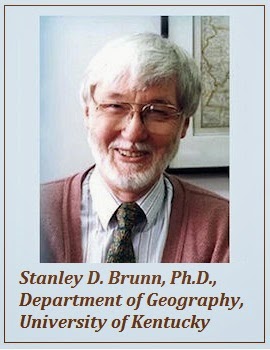
Redrawing the Global Language Map: A new, omnidisciplinary look at the present state and future of language is being planned by University of Kentucky geographer Stanley D. Brunn. The multivolume collection, tentatively titled The Changing World Language Map, proposes to cover the intersection of language and geography, with chapters contributed by scholars from all over the world and from different backgrounds. Scholars interested in contributing should contact Dr. Brunn at Brunn@uky.edu
Signal of the Month: Trees and Housing. In his monthly e-newsletter, financial adviser and futurist James Lee offers several wise tips for your 2015 financial resolutions; number 7 is saving for a new home. If your goal is to move to a better, safer neighborhood, Lee recommends going to Google Maps and looking for neighborhoods with more trees. “This is simple, but it works!” he writes in his January 9 newsletter for StratFi, The Forward View. Sign up for the free monthly e-newsletter at StratFi.

